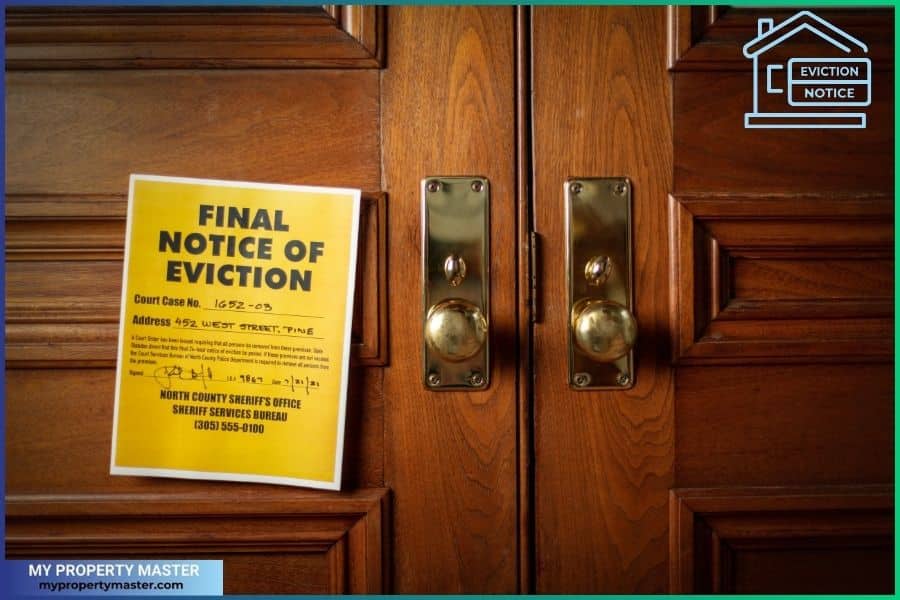Eviction is a legal notice for vacating the rental property. There are various reasons for evicting a tenant. Also, there are several types of evictions and notices.
Not all eviction notices are equal. So, their penalties and duration (time to leave) are also not equal. You can compromise, fix issues, and stay home even if you get a notice (only in a few cases).
Being evicted is not a good thing, and it can be added to your rental history. This history can negatively impact you in the tenant screening process in the future. So resolving the issue is more important than getting a couple more days or months to vacant the house.
In this article, I will discuss them all and give you a clear understanding of different types of eviction notices, their meanings, duration (time to leave home), your rights, and much more.
Let’s get started.
What is an eviction?
Before going further, you must understand the definition or what it is. Don’t worry; I will keep it short and precise.

Eviction is a legal process where landlords object to tenants, and the court sends a notice to vacant their rental properties.
However, landlords must send the tenants a written notice 30 days before starting the process.
Also, landlords must document the violation and submit it to the court. This “Violation” could be breaking a lease agreement, not paying rent, damaging property, or something along those lines.
Property management contractors or companies can also start this process if they manage your rental apartment or home.
Related: Main reasons to evict a tenant.
Do you have 30 days to move after an eviction?

One of the most common questions we get over the phone and through contact forms is, do I have 30 days to move after an eviction? So, I will give you an answer first and then walk you through all sorts of evictions and types of notices.
The time frame for moving after an eviction can vary according to the specific circumstances, the reason, the type of notice, and the laws in your jurisdiction. However, mentioning “30 days” is often associated with particular eviction notices.
For example, a “30-day Notice to Quit” might be used when terminating a month-to-month tenancy without cause. In this situation, the landlord typically gives the tenant a written notice indicating they have 30 days to move out. This type of notice allows both parties some time to make necessary arrangements. I will discuss this further in the next section.
However, it’s important to note that eviction laws and procedures differ between jurisdictions, and some locations may have different notice periods or requirements. Additionally, certain situations, such as non-payment of rent or severe lease violations, may have shorter notice periods.
To get accurate information regarding your situation, consult local landlord-tenant laws or seek legal advice. If you have received an eviction notice, it should specify the reason for the eviction and the timeframe within which you must move. If you need clarification or have concerns, consider contacting a local tenant advocacy organization or legal professional for guidance.
Related: What to look for in a lease agreement?
How many types of evictions are out there?

There are several types of evictions, each with specific circumstances and legal processes. Here are some common types of evictions:
Non-payment Eviction
The landlord initiates this type of eviction due to the tenant’s failure to pay rent on time. It is one of the most common reasons for eviction.
Typically, rent is due on a specific date each month, as outlined in the lease agreement. Some lease agreements may have a grace period during which tenants can pay without penalty. However, the landlord can take action once this period elapses without payment.
Options for landlords: What to do if the tenant doesn’t pay rent?
Violation of Lease Terms

A violation of lease terms, leading to eviction, occurs when a tenant breaches specific conditions or rules outlined in the lease agreement. Lease agreements typically include terms and conditions that tenants must follow, and violating these terms can be grounds for eviction.
Some examples are unauthorized pets, subletting without approval, property damage, illegal activities, failure to maintain property, and excessive noise or nuisance.
Read also: Can a landlord show an apartment while occupied?
End of Lease Eviction
It occurs when the lease agreement naturally expires, and the landlord chooses not to renew.
Illegal Activities

If the tenant engages in illegal activities on the property, it may lead to eviction. Landlords are vested in maintaining a safe and lawful environment for all tenants.
Here are some examples of illegal activities that may lead to eviction:
- Drug-related offenses
- Criminal activity
- Property damage or vandalism
- Disturbing the peace
- Gang-related activities
- Unlawful use of firearms
- Prostitution or illegal gambling
- Identity theft or fraud
- Harassment or threats
- Illegal subletting or Airbnb Violations (situations where tenants rent out their rented property on platforms like Airbnb or other short-term rental services)
Nuisance Eviction
It involves disruptive or bothersome behavior that interferes with the quiet enjoyment of other tenants or neighbors.
Owner Move-In Eviction
Occurs when a landlord wants to move into the property themselves or accommodate a family member.
Foreclosure Eviction

It happens when the property is foreclosed, and the new owner wishes to take possession, leading to the eviction of the current tenants.
Housing Code Violation Eviction
If the property becomes uninhabitable due to code violations and the landlord fails to address them, tenants may be forced to leave.
Retaliatory Eviction

It refers to a situation where a landlord takes adverse action, such as issuing an eviction notice, against a tenant in response to the tenant exercising their legal rights.
This could include reporting code violations, joining a tenant’s union, or taking legal action against the landlord for specific issues.
Retaliatory eviction is considered unfair and is prohibited in many jurisdictions to protect tenants from retaliation when asserting their rights.
It’s important to note that eviction laws vary by jurisdiction, so the specific rules and procedures may differ depending on your location.
How many types of eviction notices are there?

As I mentioned at the beginning, all eviction notices are not equal. Like the types or reasons for evictions, notices differ based on the type of violation, situation, and local laws.
Below, I mentioned various types of eviction notices:
Pay or Quit Notice
They are given when a tenant fails to pay rent on time. It typically provides a short period, such as 3 to 5 days, for the tenant to pay or vacate the premises.
Related: Can a landlord raise my rent by $300?
Cure or Quit Notice
They are issued when a tenant violates the lease terms, such as breaking a specific rule. The tenant is given a certain period to correct the violation or move out.
Unconditional Quit Notice

It provides no option for the tenant to remedy the situation. It is usually issued in severe cases, such as illegal activities or repeated violations, demanding the tenant to move out without any chance of correction.
30-Day or 60-Day Notice to Quit
A 30-Day or 60-Day Notice to Quit is a type of eviction notice given by a landlord to a tenant to terminate a month-to-month tenancy. It informs that the landlord intends to end the lease agreement, and the tenant must vacate the premises within the specified time frame.
The notice period can vary but is often 30 or 60 days.
Termination of Lease Notice
It’s given when a landlord decides not to renew a lease that is about to expire.
Notice to Vacate for Sale of Property
It’s used when the landlord intends to sell the property, and the tenant must vacate within a specified period.
Notice of Intent to Enter
It is not an eviction notice by itself. Still, it informs the tenant that the landlord or property manager intends to enter the premises for a specific reason, such as repairs or inspections.
Related: What is a home inspection?
3-Day Notice to Quit for Nuisance
It is issued when a tenant’s behavior is causing a nuisance or disruption, giving the tenant three days to correct the issue or leave.
It’s crucial to note that eviction notice requirements and procedures vary by jurisdiction.
What happens if you do not respond to the eviction notice?

Some of you may think or decide not to care about the eviction notice and want to see what happens in the end. However, if you do not respond to an eviction notice, it can lead to various consequences, and the specific outcome may depend on the laws in your jurisdiction and the type of eviction notice issued. Here are some potential consequences:
Automatic Loss in Court
If the eviction notice is a legal requirement for the landlord to initiate legal proceedings, failing to respond may result in an automatic loss in court. This means the court may rule in favor of the landlord by default.
Accelerated Legal Process
Non-response may expedite the legal process, leading to a quicker eviction. The landlord may file a lawsuit without your input, potentially resulting in a default judgment.
Writ of Possession

The landlord obtains a writ of possession once a court grants an eviction order. It’s a legal document that gives them the right to take possession of the property. Law enforcement may then enforce the eviction and remove you from the premises. And this may seem not very respectful.
Financial Consequences
You may be responsible for unpaid rent, legal fees, and court costs. Failing to respond to an eviction notice does not absolve you of financial obligations.
Negative Impact on Rental History

A court-ordered eviction can appear on your rental history, making it challenging to secure housing in the future. Landlords and property management companies often check rental histories before approving new tenants. It’s generally known as tenant screening.
Collection Actions
If you owe unpaid rent or other fees, the landlord may pursue collection actions to recover the money owed, potentially impacting your credit.
It’s crucial to take any eviction notice seriously and seek legal advice promptly. If you believe the eviction is unjust or if there are extenuating circumstances, consult with an attorney or a tenant advocacy organization.
As a property management contractor, I don’t recommend anyone ignoring the eviction notice. Ignoring it can result in worse cases.
Conclusion
Understanding eviction is vital for tenants facing legal notices. This article sheds light on various eviction types and notices, emphasizing the importance of clarity in timelines. While the common query centers around a 30-day move after an eviction, it’s crucial to grasp that laws vary, and circumstances impact timelines.
From non-payment issues to lease violations and severe cases like illegal activities, tenants must comprehend the eviction landscape.
In the beginning, I mentioned that eviction can be added to your rental history, and it can negatively impact you in the future. However, in some cases, you have nothing to do without leaving. Such as if the property was sold or needed long-term repairs. So, the reason for being evicted is also a significant factor.
Ignoring notices can lead to legal consequences, financial burdens, and tarnished rental histories.
As property management contractors, our advice is straightforward: take notices seriously, act promptly, and seek professional advice for a fair resolution. Proactive engagement is crucial in navigating these situations successfully.






